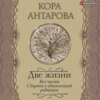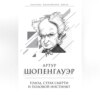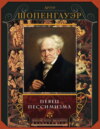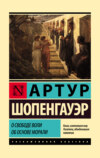Kitobni o'qish: «Essays of Schopenhauer»
PRELIMINARY
When Schopenhauer was asked where he wished to be buried, he answered, "Anywhere; they will find me;" and the stone that marks his grave at Frankfort bears merely the inscription "Arthur Schopenhauer," without even the date of his birth or death. Schopenhauer, the pessimist, had a sufficiently optimistic conviction that his message to the world would ultimately be listened to – a conviction that never failed him during a lifetime of disappointments, of neglect in quarters where perhaps he would have most cherished appreciation; a conviction that only showed some signs of being justified a few years before his death. Schopenhauer was no opportunist; he was not even conciliatory; he never hesitated to declare his own faith in himself, in his principles, in his philosophy; he did not ask to be listened to as a matter of courtesy but as a right – a right for which he would struggle, for which he fought, and which has in the course of time, it may be admitted, been conceded to him.
Although everything that Schopenhauer wrote was written more or less as evidence to support his main philosophical thesis, his unifying philosophical principle, the essays in this volume have an interest, if not altogether apart, at least of a sufficiently independent interest to enable them to be considered on their own merits, without relation to his main idea. And in dissociating them, if one may do so for a moment (their author would have scarcely permitted it!), one feels that one enters a field of criticism in which opinions can scarcely vary. So far as his philosophy is concerned, this unanimity does not exist; he is one of the best abused amongst philosophers; he has many times been explained and condemned exhaustively, and no doubt this will be as many times repeated. What the trend of his underlying philosophical principal was, his metaphysical explanation of the world, is indicated in almost all the following essays, but chiefly in the "Metaphysics of Love," to which the reader may be referred.
These essays are a valuable criticism of life by a man who had a wide experience of life, a man of the world, who possessed an almost inspired faculty of observation. Schopenhauer, of all men, unmistakably observed life at first hand. There is no academic echo in his utterances; he is not one of a school; his voice has no formal intonation; it is deep, full-chested, and rings out its words with all the poignancy of individual emphasis, without bluster, but with unfailing conviction. He was for his time, and for his country, an adept at literary form; but he used it only as a means. Complicated as his sentences occasionally are, he says many sharp, many brilliant, many epigrammatic things, he has the manner of the famous essayists, he is paradoxical (how many of his paradoxes are now truisms!); one fancies at times that one is almost listening to a creation of Molière, but these fireworks are not merely a literary display, they are used to illumine what he considers to be the truth. Rien n'est beau que le vrai; le vrai seul est aimable, he quotes; he was a deliberate and diligent searcher after truth, always striving to attain the heart of things, to arrive at a knowledge of first principles. It is, too, not without a sort of grim humour that this psychological vivisectionist attempts to lay bare the skeleton of the human mind, to tear away all the charming little sentiments and hypocrisies which in the course of time become a part and parcel of human life. A man influenced by such motives, and possessing a frank and caustic tongue, was not likely to attain any very large share of popular favour or to be esteemed a companionable sort of person. The fabric of social life is interwoven with a multitude of delicate evasions, of small hypocrisies, of matters of tinsel sentiment; social intercourse would be impossible, if it were not so. There is no sort of social existence possible for a person who is ingenuous enough to say always what he thinks, and, on the whole, one may be thankful that there is not. One naturally enough objects to form the subject of a critical diagnosis and exposure; one chooses for one's friends the agreeable hypocrites of life who sustain for one the illusions in which one wishes to live. The mere conception of a plain-speaking world is calculated to reduce one to the last degree of despair; it is the conception of the intolerable. Nevertheless it is good for mankind now and again to have a plain speaker, a "mar feast," on the scene; a wizard who devises for us a spectacle of disillusionment, and lets us for a moment see things as he honestly conceives them to be, and not as we would have them to be. But in estimating the value of a lesson of this sort, we must not be carried too far, not be altogether convinced. We may first take into account the temperament of the teacher; we may ask, is his vision perfect? We may indulge in a trifling diagnosis on our own account. And in an examination of this sort we find that Schopenhauer stands the test pretty well, if not with complete success. It strikes us that he suffers perhaps a little from a hereditary taint, for we know that there is an unmistakable predisposition to hypochondria in his family; we know, for instance, that his paternal grandmother became practically insane towards the end of her life, that two of her children suffered from some sort of mental incapacity, and that a third, Schopenhauer's father, was a man of curious temper and that he probably ended his own life. He himself would also have attached some importance, in a consideration of this sort, to the fact, as he might have put it, that his mother, when she married, acted in the interests of the individual instead of unconsciously fulfilling the will of the species, and that the offspring of the union suffered in consequence. Still, taking all these things into account, and attaching to them what importance they may be worth, one is amazed at the clearness of his vision, by his vigorous and at moments subtle perception. If he did not see life whole, what he did see he saw with his own eyes, and then told us all about it with unmistakable veracity, and for the most part simply, brilliantly. Too much importance cannot be attached to this quality of seeing things for oneself; it is the stamp of a great and original mind; it is the principal quality of what one calls genius.
In possessing Schopenhauer the world possesses a personality the richer; a somewhat garrulous personality it may be; a curiously whimsical and sensitive personality, full of quite ordinary superstitions, of extravagant vanities, selfish, at times violent, rarely generous; a man whom during his lifetime nobody quite knew, an isolated creature, self-absorbed, solely concerned in his elaboration of the explanation of the world, and possessing subtleties which for the most part escaped the perception of his fellows; at once a hermit and a boulevardier. His was essentially a great temperament; his whole life was a life of ideas, an intellectual life. And his work, the fruit of his life, would seem to be standing the test of all great work – the test of time. It is not a little curious that one so little realised in his own day, one so little lovable and so little loved, should now speak to us from his pages with something of the force of personal utterance, as if he were actually with us and as if we knew him, even as we know Charles Lamb and Izaak Walton, personalities of such a different calibre. And this man whom we realise does not impress us unfavourably; if he is without charm, he is surely immensely interesting and attractive; he is so strong in his intellectual convictions, he is so free from intellectual affectations, he is such an ingenuous egotist, so naïvely human; he is so mercilessly honest and independent, and, at times (one may be permitted to think), so mistaken.
R.D.
BIOGRAPHICAL NOTE
Arthur Schopenhauer was born at No. 117 of the Heiligengeist Strasse, at Dantzic, on February 22, 1788. His parents on both sides traced their descent from Dutch ancestry, the great-grandfather of his mother having occupied some ecclesiastical position at Gorcum. Dr. Gwinner in his Life does not follow the Dutch ancestry on the father's side, but merely states that the great-grandfather of Schopenhauer at the beginning of the eighteenth century rented a farm, the Stuthof, in the neighbourhood of Dantzic. This ancestor, Andreas Schopenhauer, received here on one occasion an unexpected visit from Peter the Great and Catherine, and it is related that there being no stove in the chamber which the royal pair selected for the night, their host, for the purpose of heating it, set fire to several small bottles of brandy which had been emptied on the stone floor. His son Andreas followed in the footsteps of his father, combining a commercial career with country pursuits. He died in 1794 at Ohra, where he had purchased an estate, and to which he had retired to spend his closing years. His wife (the grandmother of Arthur) survived him for some years, although shortly after his death she was declared insane and incapable of managing her affairs. This couple had four sons: the eldest, Michael Andreas, was weak-minded; the second, Karl Gottfried, was also mentally weak and had deserted his people for evil companions; the youngest son, Heinrich Floris, possessed, however, in a considerable degree the qualities which his brothers lacked. He possessed intelligence, a strong character, and had great commercial sagacity; at the same time, he took a definite interest in intellectual pursuits, reading Voltaire, of whom he was more or less a disciple, and other French authors, possessing a keen admiration for English political and family life, and furnishing his house after an English fashion. He was a man of fiery temperament and his appearance was scarcely prepossessing; he was short and stout; he had a broad face and turned-up nose, and a large mouth. This was the father of our philosopher.
When he was thirty-eight, Heinrich Schopenhauer married, on May 16, 1785, Johanna Henriette Trosiener, a young lady of eighteen, and daughter of a member of the City Council of Dantzic. She was at this time an attractive, cultivated young person, of a placid disposition, who seems to have married more because marriage offered her a comfortable settlement and assured position in life, than from any passionate affection for her wooer, which, it is just to her to say, she did not profess. Heinrich Schopenhauer was so much influenced by English ideas that he desired that his first child should be born in England; and thither, some two years after their marriage, the pair, after making a détour on the Continent, arrived. But after spending some weeks in London Mrs. Schopenhauer was seized with home-sickness, and her husband acceded to her entreaties to return to Dantzic, where a child, the future philosopher, was shortly afterwards born. The first five years of the child's life were spent in the country, partly at the Stuthof which had formerly belonged to Andreas Schopenhauer, but had recently come into the possession of his maternal grandfather.
Five years after the birth of his son, Heinrich Schopenhauer, in consequence of the political crisis, which he seems to have taken keenly to heart, in the affairs of the Hanseatic town of Dantzic, transferred his business and his home to Hamburg, where in 1795 a second child, Adele, was born. Two years later, Heinrich, who intended to train his son for a business life, took him, with this idea, to Havre, by way of Paris, where they spent a little time, and left him there with M. Grégoire, a commercial connection. Arthur remained at Havre for two years, receiving private instruction with this man's son Anthime, with whom he struck up a strong friendship, and when he returned to Hamburg it was found that he remembered but few words of his mother-tongue. Here he was placed in one of the principal private schools, where he remained for three years. Both his parents, but especially his mother, cultivated at this time the society of literary people, and entertained at their house Klopstock and other notable persons. In the summer following his return home from Havre he accompanied his parents on a continental tour, stopping amongst other places at Weimar, where he saw Schiller. His mother, too, had considerable literary tastes, and a distinct literary gift which, later, she cultivated to some advantage, and which brought her in the production of accounts of travel and fiction a not inconsiderable reputation. It is, therefore, not surprising that literary tendencies began to show themselves in her son, accompanied by a growing distaste for the career of commerce which his father wished him to follow. Heinrich Schopenhauer, although deprecating these tendencies, considered the question of purchasing a canonry for his son, but ultimately gave up the idea on the score of expense. He then proposed to take him on an extended trip to France, where he might meet his young friend Anthime, and then to England, if he would give up the idea of a literary calling, and the proposal was accepted.
In the spring of 1803, then, he accompanied his parents to London, where, after spending some time in sight-seeing, he was placed in the school of Mr. Lancaster at Wimbledon. Here he remained for three months, from July to September, laying the foundation of his knowledge of the English language, while his parents proceeded to Scotland. English formality, and what he conceived to be English hypocrisy, did not contrast favourably with his earlier and gayer experiences in France, and made an extremely unfavourable impression upon his mind; which found expression in letters to his friends and to his mother.
On returning to Hamburg after this extended excursion abroad, Schopenhauer was placed in the office of a Hamburg senator called Jenisch, but he was as little inclined as ever to follow a commercial career, and secretly shirked his work so that he might pursue his studies. A little later a somewhat unexplainable calamity occurred. When Dantzic ceased to be a free city, and Heinrich Schopenhauer at a considerable cost and monetary sacrifice transferred his business to Hamburg, the event caused him much bitterness of spirit. At Hamburg his business seems to have undergone fluctuations. Whether these further affected his spirit is not sufficiently established, but it is certain, however, that he developed peculiarities of manner, and that his temper became more violent. At any rate, one day in April 1805 it was found that he had either fallen or thrown himself into the canal from an upper storey of a granary; it was generally concluded that it was a case of suicide.
Schopenhauer was seventeen at the time of this catastrophe, by which he was naturally greatly affected. Although by the death of his father the influence which impelled him to a commercial career was removed, his veneration for the dead man remained with him through life, and on one occasion found expression in a curious tribute to his memory in a dedication (which was not, however, printed) to the second edition of Die Welt als Wille und Vorstellung. "That I could make use of and cultivate in a right direction the powers which nature gave me," he concludes, "that I could follow my natural impulse and think and work for countless others without the help of any one; for that I thank thee, my father, thank thy activity, thy cleverness, thy thrift and care for the future. Therefore I praise thee, my noble father. And every one who from my work derives any pleasure, consolation, or instruction shall hear thy name and know that if Heinrich Floris Schopenhauer had not been the man he was, Arthur Schopenhauer would have been a hundred times ruined."
The year succeeding her husband's death, Johanna Schopenhauer removed with her daughter to Weimar, after having attended to the settlement of her husband's affairs, which left her in possession of a considerable income. At Weimar she devoted herself to the pursuit of literature, and held twice a week a sort of salon, which was attended by Goethe, the two Schlegels, Wieland, Heinrich Meyer, Grimm, and other literary persons of note. Her son meanwhile continued for another year at the "dead timber of the desk," when his mother, acting under the advice of her friend Fernow, consented, to his great joy, to his following his literary bent.
During the next few years we find Schopenhauer devoting himself assiduously to acquiring the equipment for a learned career; at first at the Gymnasium at Gotha, where he penned some satirical verses on one of the masters, which brought him into some trouble. He removed in consequence to Weimar, where he pursued his classical studies under the direction of Franz Passow, at whose house he lodged. Unhappily, during his sojourn at Weimar his relations with his mother became strained. One feels that there is a sort of autobiographical interest in his essay on women, that his view was largely influenced by his relations with his mother, just as one feels that his particular argument in his essay on education is largely influenced by the course of his own training.
On his coming of age Schopenhauer was entitled to a share of the paternal estate, a share which yielded him a yearly income of about £150. He now entered himself at the University of Göttingen (October 1809), enrolling himself as a student of medicine, and devoting himself to the study of the natural sciences, mineralogy, anatomy, mathematics, and history; later, he included logic, physiology, and ethnography. He had always been passionately devoted to music and found relaxation in learning to play the flute and guitar. His studies at this time did not preoccupy him to the extent of isolation; he mixed freely with his fellows, and reckoned amongst his friends or acquaintances, F.W. Kreise, Bunsen, and Ernst Schulze. During one vacation he went on an expedition to Cassel and to the Hartz Mountains. It was about this time, and partly owing to the influence of Schulze, the author of Aenesidemus, and then a professor at the University of Göttingen, that Schopenhauer came to realise his vocation as that of a philosopher.
During his holiday at Weimar he called upon Wieland, then seventy-eight years old, who, probably prompted by Mrs. Schopenhauer, tried to dissuade him from the vocation which he had chosen. Schopenhauer in reply said, "Life is a difficult question; I have decided to spend my life in thinking about it." Then, after the conversation had continued for some little time, Wieland declared warmly that he thought that he had chosen rightly. "I understand your nature," he said; "keep to philosophy." And, later, he told Johanna Schopenhauer that he thought her son would be a great man some day.
Towards the close of the summer of 1811 Schopenhauer removed to Berlin and entered the University. He here continued his study of the natural sciences; he also attended the lectures on the History of Philosophy by Schleiermacher, and on Greek Literature and Antiquities by F.A. Wolf, and the lectures on "Facts of Consciousness" and "Theory of Science" by Fichte, for the last of whom, as we know indeed from frequent references in his books, he had no little contempt. A year or so later, when the news of Napoleon's disaster in Russia arrived, the Germans were thrown into a state of great excitement, and made speedy preparations for war. Schopenhauer contributed towards equipping volunteers for the army, but he did not enter active service; indeed, when the result of the battle of Lützen was known and Berlin seemed to be in danger, he fled for safety to Dresden and thence to Weimar. A little later we find him at Rudolstadt, whither he had proceeded in consequence of the recurrence of differences with his mother, and remained there from June to November 1813, principally engaged in the composition of an essay, "A Philosophical Treatise on the Fourfold Root of the Principle of Sufficient Reason," which he offered to the University of Jena as an exercise to qualify for the degree of Doctor of Philosophy, and for which a diploma was granted. He published this essay at his own cost towards the end of the year, but it seems to have fallen flatly from the press, although its arguments attracted the attention and the sympathy of Goethe, who, meeting him on his return to Weimar in November, discussed with him his own theory of colour. A couple of years before, Goethe, who was opposed to the Newtonian theory of light, had brought out his Farbenlehre (colour theory). In Goethe's diary Schopenhauer's name frequently occurs, and on the 24th November 1813 he wrote to Knebel: "Young Schopenhauer is a remarkable and interesting man… I find him intellectual, but I am undecided about him as far as other things go." The result of this association with Goethe was his Ueber das Sehn und die Farben ("On Vision and Colour"), published at Leipzig in 1816, a copy of which he forwarded to Goethe (who had already seen the MS.) on the 4th May of that year. A few days later Goethe wrote to the distinguished scientist, Dr. Seebeck, asking him to read the work. In Gwinner's Life we find the copy of a letter written in English to Sir C.L. Eastlake: "In the year 1830, as I was going to publish in Latin the same treatise which in German accompanies this letter, I went to Dr. Seebeck of the Berlin Academy, who is universally admitted to be the first natural philosopher (in the English sense of the word meaning physiker) of Germany; he is the discoverer of thermo-electricity and of several physical truths. I questioned him on his opinion on the controversy between Goethe and Newton; he was extremely cautious and made me promise that I should not print and publish anything of what he might say, and at last, being hard pressed by me, he confessed that indeed Goethe was perfectly right and Newton wrong, but that he had no business to tell the world so. He has died since, the old coward!"
In May 1814 Schopenhauer removed from Weimar to Dresden, in consequence of the recurrence of domestic differences with his mother. This was the final break between the pair, and he did not see her again during the remaining twenty-four years of her life, although they resumed correspondence some years before her death. It were futile to attempt to revive the dead bones of the cause of these unfortunate differences between Johanna Schopenhauer and her son. It was a question of opposing temperaments; both and neither were at once to blame. There is no reason to suppose that Schopenhauer was ever a conciliatory son, or a companionable person to live with; in fact, there is plenty to show that he possessed trying and irritating qualities, and that he assumed an attitude of criticism towards his mother that could not in any circumstances be agreeable. On the other hand, Anselm Feuerbach in his Memoirs furnishes us with a scarcely prepossessing picture of Mrs. Schopenhauer: "Madame Schopenhauer," he writes, "a rich widow. Makes profession of erudition. Authoress. Prattles much and well, intelligently; without heart and soul. Self-complacent, eager after approbation, and constantly smiling to herself. God preserve us from women whose mind has shot up into mere intellect."
Schopenhauer meanwhile was working out his philosophical system, the idea of his principal philosophical work. "Under my hands," he wrote in 1813, "and still more in my mind grows a work, a philosophy which will be an ethics and a metaphysics in one: – two branches which hitherto have been separated as falsely as man has been divided into soul and body. The work grows, slowly and gradually aggregating its parts like the child in the womb. I became aware of one member, one vessel, one part after another. In other words, I set each sentence down without anxiety as to how it will fit into the whole; for I know it has all sprung from a single foundation. It is thus that an organic whole originates, and that alone will live… Chance, thou ruler of this sense-world! Let me live and find peace for yet a few years, for I love my work as the mother her child. When it is matured and has come to birth, then exact from me thy duties, taking interest for the postponement. But, if I sink before the time in this iron age, then grant that these miniature beginnings, these studies of mine, be given to the world as they are and for what they are: some day perchance will arise a kindred spirit, who can frame the members together and 'restore' the fragment of antiquity."1
By March 1817 he had completed the preparatory work of his system, and began to put the whole thing together; a year later Die Welt als Wille und Vorstellung: vier Bücher, nebst einem Anhange, der die Kritik der Kantischen Philosophie enthält ("The World as Will and Idea; four books, with an appendix containing a criticism on the philosophy of Kant"). Some delay occurring in the publication, Schopenhauer wrote one of his characteristically abusive letters to Brockhaus, his publisher, who retorted "that he must decline all further correspondence with one whose letters, in their divine coarseness and rusticity, savoured more of the cabman than of the philosopher," and concluded with a hope that his fears that the work he was printing would be good for nothing but waste paper, might not be realised.2 The work appeared about the end of December 1818 with 1819 on the title-page. Schopenhauer had meanwhile proceeded in September to Italy, where he revised the final proofs. So far as the reception of the work was concerned there was reason to believe that the fears of Brockhaus would be realised, as, in fact, they came practically to be. But in the face of this general want of appreciation, Schopenhauer had some crumbs of consolation. His sister wrote to him in March (he was then staying at Naples) that Goethe "had received it with great joy, immediately cut the thick book, and began instantly to read it. An hour later he sent me a note to say that he thanked you very much and thought that the whole book was good. He pointed out the most important passages, read them to us, and was greatly delighted… You are the only author whom Goethe has ever read seriously, it seems to me, and I rejoice." Nevertheless the book did not sell. Sixteen years later Brockhaus informed Schopenhauer that a large number of copies had been sold at waste paper price, and that he had even then a few in stock. Still, during the years 1842-43, Schopenhauer was contemplating the issue of a second edition and making revisions for that purpose; when he had completed the work he took it to Brockhaus, and agreed to leave the question of remuneration open. In the following year the second edition was issued (500 copies of the first volume, and 750 of the second), and for this the author was to receive no remuneration. "Not to my contemporaries," says Schopenhauer with fine conviction in his preface to this edition, "not to my compatriots – to mankind I commit my now completed work, in the confidence that it will not be without value for them, even if this should be late recognised, as is commonly the lot of what is good. For it cannot have been for the passing generation, engrossed with the delusion of the moment, that my mind, almost against my will, has uninterruptedly stuck to its work through the course of a long life. And while the lapse of time has not been able to make me doubt the worth of my work, neither has the lack of sympathy; for I constantly saw the false and the bad, and finally the absurd and senseless, stand in universal admiration and honour, and I bethought myself that if it were not the case, those who are capable of recognising the genuine and right are so rare that we may look for them in vain for some twenty years, then those who are capable of producing it could not be so few that their works afterwards form an exception to the perishableness of earthly things; and thus would be lost the reviving prospect of posterity which every one who sets before himself a high aim requires to strengthen him."3
When Schopenhauer started for Italy Goethe had provided him with a letter of introduction to Lord Byron, who was then staying at Venice, but Schopenhauer never made use of the letter; he said that he hadn't the courage to present himself. "Do you know," he says in a letter, "three great pessimists were in Italy at the same time – Byron, Leopardi, and myself! And yet not one of us has made the acquaintance of the other." He remained in Italy until June 1819, when he proceeded to Milan, where he received distressing news from his sister to the effect that a Dantzic firm, in which she and her mother had invested all their capital, and in which he himself had invested a little, had become bankrupt. Schopenhauer immediately proposed to share his own income with them. But later, when the defaulting firm offered to its creditors a composition of thirty per cent, Schopenhauer would accept nothing less than seventy per cent in the case of immediate payment, or the whole if the payment were deferred; and he was so indignant at his mother and sister falling in with the arrangement of the debtors, that he did not correspond with them again for eleven years. With reference to this affair he wrote: "I can imagine that from your point of view my behaviour may seem hard and unfair. That is a mere illusion which disappears as soon as you reflect that all I want is merely not to have taken from me what is most rightly and incontestably mine, what, moreover, my whole happiness, my freedom, my learned leisure depend upon; – a blessing which in this world people like me enjoy so rarely that it would be almost as unconscientious as cowardly not to defend it to the uttermost and maintain it by every exertion. You say, perhaps, that if all your creditors were of this way of thinking, I too should come badly off. But if all men thought as I do, there would be much more thinking done, and in that case probably there would be neither bankruptcies, nor wars, nor gaming tables."4




















